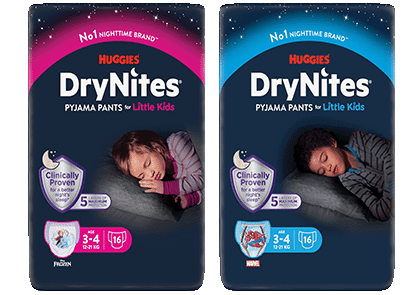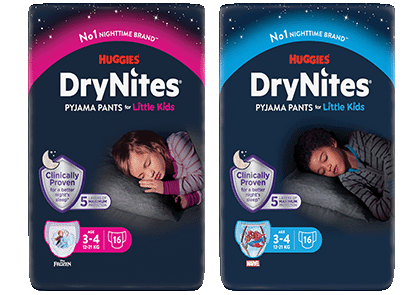
Get your free sample
What are the common causes of bedwetting?
It’s generally agreed that bedwetting (also known as enuresis) can be caused by a number of developmental or emotional factors, such as stress and anxiety.
Occasionally, it can be an indication of an underlying medical issue. We spoke to Consultant Urological Surgeon Mr Rajesh Kavia to understand the most common causes of and reasons for bedwetting, plus how you can help.
In short, some common causes of and reasons for bedwetting include:
|
Causes and reasons |
What does this mean? |
|
Having a small bladder |
Your child’s bladder is pretty small, so may not be big enough to hold all their urine for the night. |
|
Your child’s brain needs to make the connection between their bladder being full and needing to get to the loo on time |
Sometimes, they don’t make the connection in time, especially if they are asleep |
|
Stress and anxiety |
This may be a problem at home, a difficult situation at school (e.g. bullying), or a traumatic event such as a parental divorce, death or even a house move. |
|
Constipation |
If your child is having problems with constipation, they may need to pee more frequently or urgently as their belly is so full. |
|
Sometimes there is an underlying medical or physical issue |
You need to speak to your GP if you think this might be the case and they can refer you to a specialist. |
What are primary and secondary enuresis?
“Simply put,” says Mr Kavia, “primary enuresis is someone who has wet the bed since they were a baby.
“Secondary enuresis is a condition where a child has been potty trained but then reverts to wetting the bed.”
What causes primary bedwetting?
Usually, Mr Kavia explained to us, there are some simple reasons behind this:
- Your child cannot yet hold their urine for an entire night.
- They don’t wake up when their bladder is full.
- Their bladder is very small, so may need more time before they can hold enough to last the night.
- They have had too much to drink – or drinks that might cause them to urinate more – before bed.
- They naturally produce more urine in the evening and at night.
- They may not have been to the loo as often as they need to during the day.
What causes secondary bedwetting?
If your child was previously dry at night and has been having accidents at night, there may be a reason for this. Some of the most common are:
Frequent constipation
“If your little one is constipated, this squeezes the bladder, so they may wet themselves,’ explains Mr Kavia.
“You will need to address the reasons for their constipation and offer some solutions, such as a diet rich in fruit, vegetables and whole grains, plenty of water and exercise.”
Urinary Tract Infections
If your little one has managed to pick up a Urinary Tract Infection, you’ll realise that the pain and discomfort can make controlling the bladder very difficult.
“Make sure you get advice from your pharmacist in the first place to treat this and speak to your doctor if it doesn’t clear up quickly. Keep giving your child plenty to drink, as this makes their pee less acidic and therefore less stingy!” advises Mr Kavia.
An underlying medical condition, such as diabetes
The sudden return of bedwetting in a child may be a sign that they have diabetes.
If you think this may be the case, there are signs of childhood diabetes to look out for, such as passing larger amounts of wee at the same time than is normal, being tired and being constantly thirsty.
A physical problem
Sometimes, a child may have something wrong with them that causes the muscles involved in urination not to work quite as well as in some other children. This may be in the organs, muscles or nerves. Look out for any leg weakness or numbness, or even balance problems.
Sleep apnea
If your child has a physical problem with their airways, such as those caused by adenoids or enlarged tonsils, they may have disrupted breathing.
“This can have a poor effect on sleep and because the brain is working harder to ensure the body has enough oxygen, it can cause other functions like bladder control to be affected,” says Mr Kavia.
Does bedwetting run in families?
Myth busting: Some things definitely do not cause bedwetting
There are lots of myths out there but these are the things that definitely do NOT cause bedwetting:
Myth: it’s your parenting skills
You are actually the best thing to help your child get to grips with this, so keep the lines of communication open and listen to your child.
Myth: it’s naughtiness.
Kids don’t do this on purpose. They are not being lazy or naughty.
Myth: it’s wearing protective nightwear.
Kids won’t wet the bed because they have pull-ups or similar on. It’s not laziness. In fact, having DryNites® Pyjama Pants can give them confidence, allow them to sleep well and help them on the road to being dry at night.
Myth: your child is sleeping ‘too deeply’.
If your child is deeply asleep, this does not, in itself, cause bedwetting. Rather, your child doesn’t recognise the need to pee. Although they are not able to rouse themselves to go to the loo, bedwetting children are likely to have poorer sleep quality than children who are dry.
Myth: ignore it and it will go away.
This is partially true. While completely ignoring it may give your child more anxiety, it is likely to be a developmental stage that they will grow out of.
Myth: you need to wake them often to use the loo.
This treats the symptom rather than the cause and doesn’t let your child get enough good quality sleep.
Myth: they have a medical condition.
While this may be true in a small number of children, it’s not usually the cause.
Remember, it’s common if your child is wetting the bed
You’re not alone.
Most parents have gone through this at one time or another.
Most children will stop wetting the bed on their own, though obviously your support and encouragement can make all the difference.
There are lots of effective ways to manage night-time bedwetting. These can include coping strategies between you and your child such as having clean sheets handy, making sure they can easily reach the bathroom and that they use the loo last thing before bedtime. You can also turn to DryNites® Pyjama Pants or Bed Mats to allow your child to have an undisturbed night and good sleep.
In most cases, wetting the bed at night does not mean that your child has a medical condition, though you can rule this out by speaking to your GP. Your GP or the specialist, will give reassurance and may organise some tests or try medications.
You don’t have to have all the answers
As a parent, you may feel that you have to ‘fix’ every problem your child goes through.
However, this is a phase that your child usually grows out of given time and support. You don’t need to feel that you have to have all the solutions!




 your parenting partner
your parenting partner